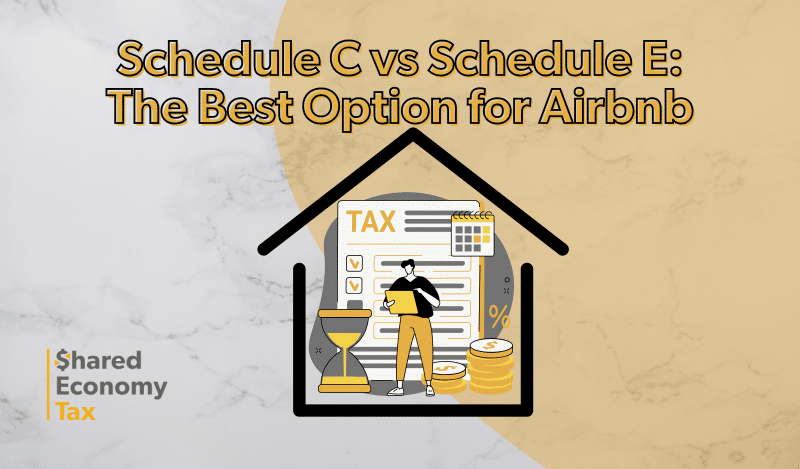
Airbnb hosts have two options for declaring rental income on their tax return. Each presents its own benefits and drawbacks, so the best choice for you will depend on several factors. In this post, I’ll look at both options in a Schedule C vs Schedule E comparison so you can decide the best option for your rental income.
Schedule C vs Schedule E for Airbnb Income
Not all Airbnb income is taxed the same way.
Some hosts should report their rental income on Schedule E. Others may need to report it on Schedule C.
And the difference isn’t just paperwork — it can affect whether you owe self-employment tax, whether you can deduct losses, and even whether you qualify for retirement contributions.
So how do you know which one applies to you?
It comes down to how your Airbnb operates.
What is Schedule C?
Schedule C is used to report income from an active business.
In the Airbnb world, this usually applies when your rental starts to look less like a traditional property and more like a short-term hospitality operation.
If you’re heavily involved in managing the guest experience or offering services that go beyond simply providing a place to stay, the IRS may view your activity as a business rather than a passive rental.
The upside is flexibility. Schedule C can allow losses to offset other income and may help you qualify for retirement contributions.
The downside is that net income is subject to self-employment tax, in addition to ordinary income tax.
What is Schedule E?
Schedule E is typically used to report rental income from real estate.
For many Airbnb hosts, this is the more familiar setup — especially if your role resembles that of a landlord rather than a service provider.
When income is reported on Schedule E, it generally isn’t subject to self-employment tax. That can be a significant advantage.
It may also allow you to deduct certain passive losses, although those deductions are limited based on your income level.
How Airbnb Income Fits Into Real Estate Income
At its core, Airbnb income is still real estate income.
The IRS doesn’t treat short-term rentals as a completely separate category — instead, they evaluate them based on how closely the activity resembles traditional property ownership versus an active business.
Most long-term rental properties clearly fall under real estate income and are reported on Schedule E. The owner provides housing, collects rent, and maintains the property, but typically does not offer services beyond basic upkeep.
Short-term rentals can blur that line.
If your Airbnb operates more like a traditional rental — where your primary role is providing access to the property — it may still be treated as real estate income.
However, when your involvement begins to resemble hospitality — such as offering frequent cleaning, guest services, or other stay-related amenities — the activity may shift toward business income.
In other words, the distinction between Schedule C and Schedule E isn’t about whether you use Airbnb. It’s about whether your activity looks more like:
- owning and leasing real estate, or
- operating a service-driven rental business
Understanding this difference helps ensure your income is classified correctly and taxed appropriately.
The Real Difference for Airbnb Hosts
Airbnb itself doesn’t determine whether you file on Schedule C or Schedule E.
What matters is how you run your rental.
Shorter stays and hands-on involvement can shift your activity toward business treatment. For example, hosts who provide hotel-like services — such as frequent cleaning during stays, concierge-style support, or other guest-focused offerings — may find their activity treated more like an active business.
On the other hand, if your role is primarily limited to maintaining the property and managing bookings, your rental is more likely to fall under Schedule E.
Length of stay can also matter. Rentals with very short average guest stays may be viewed differently than longer-term arrangements.

Schedule E vs Schedule C: Which Is Better?
Many hosts assume Schedule E is always the better option because it avoids self-employment tax.
But it’s not always that simple.
Schedule C can sometimes offer greater flexibility with deductions and retirement planning. Schedule E, meanwhile, may allow you to avoid additional payroll-style taxes and benefit from passive loss rules.
Higher-income hosts should also be aware that Schedule E income may be subject to the Net Investment Income Tax.
The “best” choice depends on how involved you are in day-to-day operations and the nature of your guest services.
A Warning on a Potential Audit Trigger
Switching your rental income reporting between Schedule C and Schedule E frequently may attract the IRS’s attention. If you change which way you report, you could receive an IRS inquiry or, even worse, an audit.
Always ensure that you meet the requirements for the option you use each year and keep documentation to support your claim in the event of IRS scrutiny. Your reporting should reflect how your rental is actually run. Keeping documentation of your services and guest patterns can help support your position if it’s ever reviewed.
Final Thoughts on Schedule E vs Schedule E for Airbnb Hosts
For many hosts, the decision isn’t obvious.
Some Airbnb rentals function like small hospitality businesses. Others operate more like traditional rental properties.
Because the tax treatment can affect self-employment taxes, deductions, and retirement eligibility, it’s worth getting the classification right.
Shared Economy Tax works with Airbnb hosts every day to navigate these decisions. If you’re unsure which schedule applies to your situation, schedule a one-on-one strategy session with one of our tax professionals to review your setup and make sure you’re on the right track.